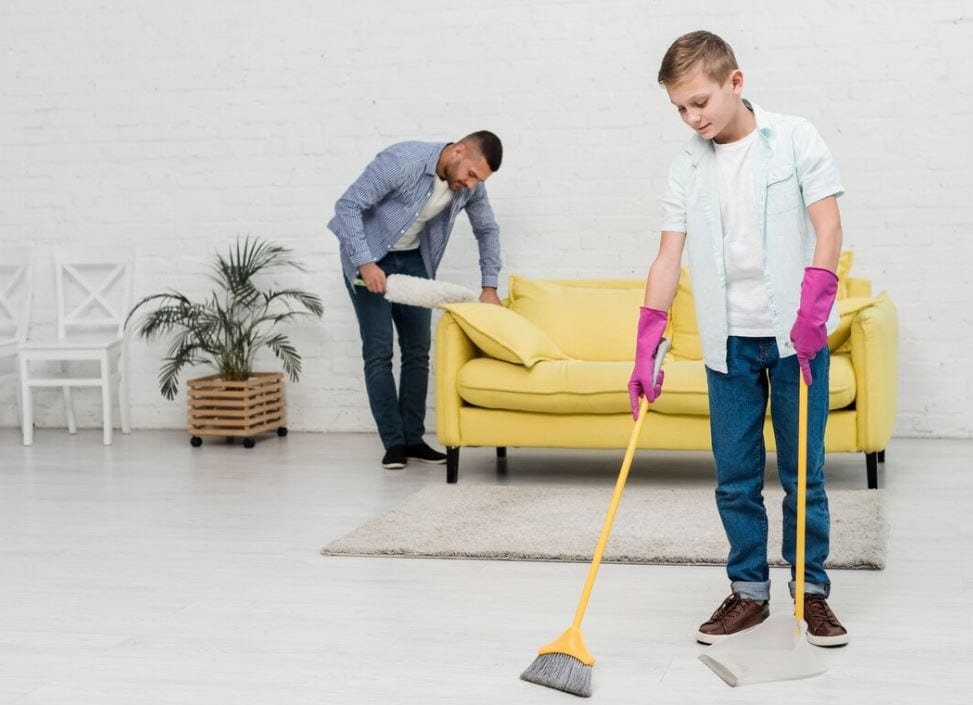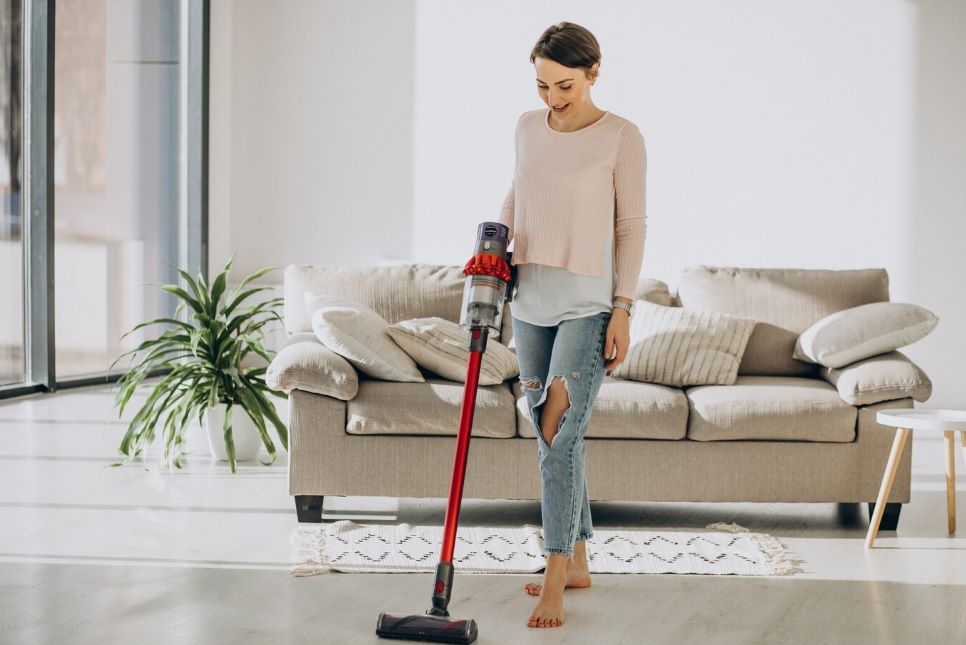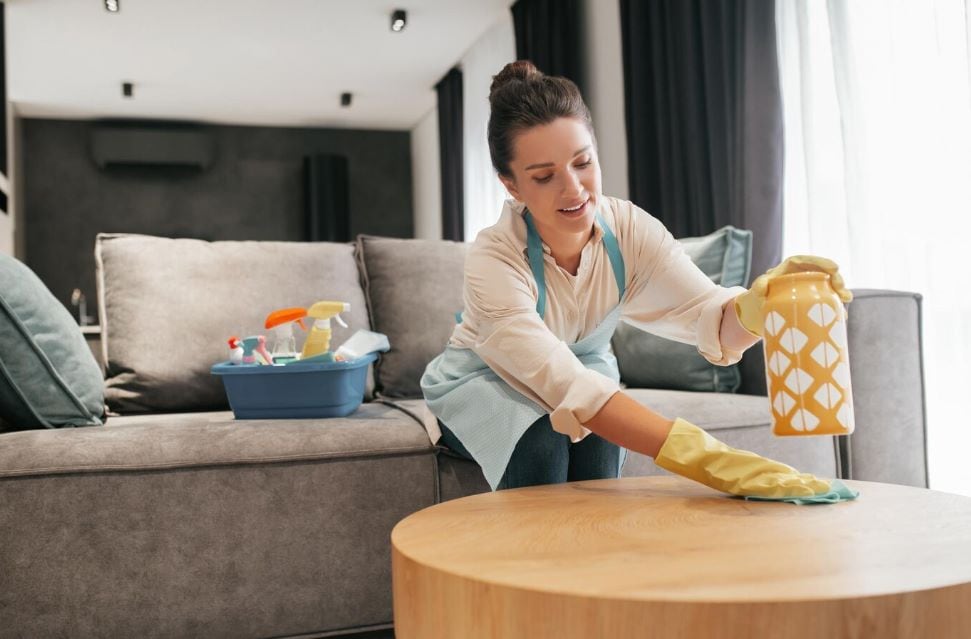Having company over may be fun; many people like getting their house ready for visitors. When unexpected visitors are expected, you may have to scramble to get your home in order. Calm down and prioritise cleaning the rooms where your guests will spend the most time. Do a short surface cleaning instead of thoroughly cleaning before someone knocks on the door.
Strategy Formation for Cleaning
Get a trash bag and a map before you start cleaning.
Please take out the rubbish from the rooms your guests will be using before you start cleaning them. Get rid of old periodicals, food waste, and paperwork from school or work. It's important to eliminate these messes immediately because visitors will look at them.
- Before your guests arrive, take another look around with a washing hamper. This time, collect the clutter from all the rooms and throw it away in the hamper. After sorting through the house and depositing unwanted stuff in the hamper, take everything back where it came from.
- Take the breakfast dishes from the couch and put them in the machine, for instance.
Scrub the floor to the ceiling.

It is best practice to start cleaning at eye level and work your way down to the floor, whether dusting a bookcase or wiping down kitchen countertops. By doing so, you may ensure that every inch of the appliance or space is thoroughly cleaned, as dust will be pushed down from the upper surfaces. If you clean from the ground up, grime and residue may be left on furniture and other fixtures up high.
- This procedure should be followed while cleaning on any scale. If you start at the top of your home and work your way down, dust and grime from the upper floors will get tracked into the lower levels. Then, when you're done vacuuming and dusting the basement, it'll be spotless.
Clean the most obvious areas first.
Unexpected visitors are more likely to notice unclean windows and table surfaces than they are to notice a cluttered pantry. Fingerprints are easily apparent and should be cleaned from large, highly visible surfaces like windows, tabletops, and counters. Use a similar all-purpose cleaner to sanitise the most visible areas of the room. You may already have some or all of these items, or you can buy them in a supermarket or convenience store.
- Windows and other large surfaces are easier to clean if you see them as a grid. You can more effectively clean the entire window if you work from the top left corner to the top right, to the middle left, and so on.
Cleaning Heavily Used Spaces
Put order and cleanliness near the entrance door.
Unexpected visitors will most likely enter your home through the front entrance, so this is the first impression you want to make. If coats or shoes are lying around, pick them up and put them where they belong.
- The foyer floor should also be cleaned; if carpeted, it should be vacuumed. The entrance could use a fast mopping if it is tiled or linoleum.
Clean the table and the kitchen.
Prepare the kitchen for guests who may be eating or assisting with meal preparation by straightening and wiping down equipment, stoves, countertops, and tabletops. Wipe off the kitchen counters and sink after spraying them with Windex or a store-brand all-purpose cleaner.
- If you find yourself without a duster, put on an old sock and use it as one.
Clean up and tidy up the restroom.
If guests visit for any length, they will require access to restroom facilities. You should whip out the Comet and the toilet cleaning and give the sink and toilet a fast scrub, depending on how dirty they are.
- Put out clean towels, arrange the mats so they are neat, and pick up all the toothbrushes, razors, and other toiletries left around.
Don't bother cleaning infrequently used spaces.
Rooms or areas of the house that your guests are not likely to view or access, such as a bedroom or home office on the second floor, do not need to be cleaned. It would help if you didn't waste time cleaning places nobody will ever see.
- Put the messiest stuff in a room that guests are not likely to see, and close the door if you have a lot of clutter that needs to be cleaned up quickly.
Maximising the Time You Spend Cleaning
Organise your space.
While your guests probably won't conduct a thorough cleanliness check, they will certainly take note of any mess or disorganisation they encounter. Before you remove the mops and buckets, try clearing away the clutter; getting rid of (or concealing) a pile of old magazines, for example, will save more time than scrubbing the kitchen sink.
- Make your bed, put away any books or magazines that may have been left lying around, close the shower curtain, and stock up on toilet paper.
Focus your vacuuming efforts where they will have the most impact.
Carpets and rugs may not get dirty as quickly as other surfaces, but they can still benefit greatly from good vacuuming. If you need more time, prioritise vacuuming the living room, entryway, and corridors where your guests will spend the most time. Large, open spaces should be the first to be vacuumed, as guests are less likely to notice dust bunnies in a hidden nook of the living room.
- Ensure the bag or dust receptacle in your vacuum is empty before cleaning. Cleaning the carpets with a vacuum with a bag that is already full is a waste of time.
Let the cleaning supplies sit for a while.
The standard procedure for using cleaning products is to spray or apply the solution, let it set for 10–15 minutes, and then wipe or scrub the surface clean. Your work (removing dirt and stains) will simplify your work if you give these items time to sit. Spray or apply cleaning supplies everywhere you'll be using them before you begin cleaning, including the kitchen and the bathroom.
- It's best to concentrate on other forms of straightening while waiting for cleaning materials to dry. Make your bed and set out fresh towels as you wait for the toilet to dry after spraying disinfectant.
There Are So Many Advantages to Keeping Your House Clean
Minimising the Impact of Allergies
Common allergens include dust, animal dander, and mould. Maintaining a clean home can reduce or eliminate the allergens that cause these irritating symptoms.
You should change the air filter in your HVAC system once a month and dust all of your home's surfaces regularly. Just a little routine housekeeping goes a long way towards making your home healthier and allergy-free.
Eliminates Anxiety
Stress and dissatisfaction are the first things you feel when you enter a dirty and messy home. On the other hand, returning to a clean and organised home might help you relax after a long day. If you let the house go uncleaned for too long, the piled-up chores and cleaning responsibilities will haunt you and add tension. The mere sight of a messy home triggers anxiety in some people. This is why many full-time people employ a maid to help them with cleaning and other domestic duties.
Fewer Pests
Dirty homes and kitchens attract mice and cockroaches. Insects and rodents will be much less likely to make your home their new habitat if you maintain a clean environment.
Maintaining a clean home regularly can greatly lessen or even eliminate bug concerns. Consider looking into hiring maid services to ensure your home is always spotless.
Keeping Your Investment Safe and Sound
Maintaining fixtures, furniture, and flooring can be costly, but these investments are made to last for decades. Maintaining your furniture and flooring for a long time may be easier if it is clean.
Carpets and rugs can be kept in better condition for longer if you vacuum them frequently. Make sure the things you've spent your hard-earned money on endure as long as possible by regularly cleaning leather and upholstery and wiping down wood furniture.
Quality of Air Improves
As a bonus to making your home look and feel filthier, dust can also lower the air quality within. Regular wiping down of surfaces and dusting of furniture and shelves is essential.
Your likelihood of experiencing sneezes and other issues decreases as the amount of dust in the air decreases. One of the most crucial aspects of a sanitary and healthy home is its indoor air quality.
Common Cleaning Mistakes that Lead to a Dirtier Home
Using Unclean Equipment to Clean
You can only expect results from your cleaning practice if you use effective tools. Ensure your cleaning supplies are in working order before starting so you don't spread germs and dust around the house. Regular washing of cleaning utensils and equipment is essential for preventing the spread of germs. If you want to get the most out of your vacuum cleaner, empty it as soon as it fills up, and wash or replace the filter regularly.
Putting Disinfecting Ahead of Cleaning
When cleaning surfaces, it's important to distinguish between cleaning and disinfecting. Disinfecting employs chemicals to kill bacteria, while cleaning removes them from the surface. However, the disinfectant will not be able to kill the bacteria if the surface is dirty. Thus, cleaning is the first step. Ensure no residue or dirt on the surface before applying a disinfectant spray.
Too Quick a Wipe After Cleaning

It's not can be more challenging to get some cleaner on a surface, wipe it down, and call it clean. It's important to be patient while using disinfectants because of this. To successfully eradicate germs, the surface may need to be visibly moist for several minutes. Before using a sanitiser or disinfectant, it is important to check the label to see how long the product should remain in contact with the surface.
The Overuse of One Cleaning Cloth
Using the same cleaning cloth in every room of the house may seem more economical, but doing so actually spreads dirt and bacteria. For instance, you wouldn't want restroom germs to spread to your kitchen countertops. Clothes should be washed frequently, and different ones should be used in different rooms. If you're cleaning with disposable wipes, use just one wipe per surface.
Lack of Adequate Ventilation
Cleaning products with ammonia or bleach require enough ventilation. Cleaning with these chemicals can discharge irritating smells into the air. Open a window, activate an air purifier, or activate the vent fan to help clear the air. When you're done tidying up, please exit the room immediately.
Conclusion
If you know what you're doing, cleaning the outside of a house can be easy. Find a warm, sunny day to start and get the house ready to be cleaned. Close the windows and doors and put plastic over the plugs to keep the outside safe. Take away the outdoor sets and cover the grass with plastic sheets to protect it. If you are using a power washer, keep your kids and dogs inside.
You can get rid of stains with water and soap, but stay away from strong cleaners. Make a drink out of oxygen bleach powder to get rid of mildew. Goggles and rubber gloves should be worn when working with bleach.
Use a garden hose or a brush to clean the outside, making your way up from the bottom. Spray water all over the house, beginning at the top and making your way down. If you are using a power washer, start with the lowest setting and slowly lower it until it is at 25 degrees.
First, use the power washer to clean up a small area of the house, paying special attention to any weak or worn-out materials. Spray down to keep structures from getting damaged. While you clean, keep your grip on the pressure washer steady and move it from side to side. With a spray cleaner, begin at the top and work your way down.
It's important to pressure wash your home to protect it from damage caused by mould, mildew, and spots. With regular upkeep, these problems can be avoided and the outside will always look clean.
Regularly cleaning the outside of your home can save you money, keep it in good shape, and keep its value. To save money and make cleaning easy, you should hire a professional outside house cleaning service. For a clean, smooth, and germ-free surface before sanding, priming, and painting, pressure washing the outside is a great way to get it ready.
By pressure washing the outside of your house, you can lower the risks to your health and safety. Mould doesn't grow or spread inside the house, and it helps get rid of allergens like dust, pollen, and dirt. By pressure washing paths regularly, you can get rid of clumps of weeds and algae that make them slippery.
Because they use less soaps and other cleaning products and blast water at surfaces, power washing and pressure washing are better for the environment than cleaning by hand. When cleaning the outside of your house, don't forget to take precautions, try cleaning solutions, use a cleaner that doesn't work, skip the gutters, press too hard, forget to wash the windows, or use the right tools.
You can get the job done faster and easier if you hire a professional cleaner. They have the right tools and training to clean safely and effectively. If you follow these tips, you can keep your home in great shape for years to come.
Content Summary
- Learn how to quickly clean your house for unexpected guests.
- Preparing for unexpected visitors can be a fun challenge.
- Prioritize cleaning the rooms your guests will spend the most time in.
- Focus on surface cleaning rather than deep cleaning.
- Start by getting a trash bag and a plan in place.
- Remove rubbish from guest-use rooms immediately.
- Dispose of old magazines, food waste, and paperwork.
- Take a quick look around with a laundry hamper before guests arrive.
- Collect clutter from all rooms and put it away.
- Ensure breakfast dishes are out of sight.
- Start cleaning from the floor to the ceiling.
- Dust and clean at eye level first.
- Cleaning top to bottom prevents dust from spreading.
- Follow the same procedure for cleaning on any scale.
- Clean the most noticeable areas first.
- Prioritise cleaning windows, table surfaces, and counters.
- Use an all-purpose cleaner for visible surfaces.
- Consider using a grid pattern for cleaning large surfaces.
- Begin with the entrance area for a good first impression.
- Pick up coats and shoes near the entrance.
- Vacuum or mop the entrance floor.
- Prepare the kitchen for guests.
- Straighten and wipe down kitchen surfaces.
- Use an old sock as a makeshift duster if needed.
- Clean and tidy up the restroom for guests.
- Scrub the sink and toilet if necessary.
- Arrange clean towels and toiletries neatly.
- Skip cleaning infrequently used spaces.
- Put clutter in a hidden room and close the door.
- Organise your space to create a cleaner look.
- Make your bed and tidy up personal items.
- Focus vacuuming efforts in high-traffic areas.
- Vacuum open spaces first for a cleaner appearance.
- Ensure your vacuum bag or dust receptacle is empty.
- Allow cleaning supplies to sit before wiping.
- Concentrate on straightening while waiting for items to dry.
- The benefits of keeping your house clean include allergy reduction.
- Change HVAC filters monthly and dust regularly.
- A clean and organised home can reduce stress.
- Returning to a clean home can help you relax.
- Dirty homes attract pests like mice and cockroaches.
- Regular cleaning can deter bugs from your home.
- Cleaning extends the life of fixtures and furniture.
- Carpets and rugs last longer with regular vacuuming.
- Dusting improves indoor air quality.
- Less dust means fewer allergies and sneezing.
- Maintaining clean equipment is crucial for effective cleaning.
- Cleaning should come before disinfecting surfaces.
- Patience is key when using disinfectants.
- Use different cleaning cloths for different rooms to prevent spreading germs.
Frequently Asked Questions About Cleaning
A quick sweep can remove the most visible debris. Consider using a microfiber mop or cleaning pads for a speedy solution.
Concentrate on the most noticeable areas, such as coffee tables and shelves at eye level.
Focus on making the bed, fluffing the pillows, and tidying up. Guests will appreciate the effort.
Light a scented candle or use air fresheners in key areas, like the entryway and bathroom.
Don't stress about perfection. A warm welcome, a friendly attitude, and a tidy, inviting space matter most to guests.
